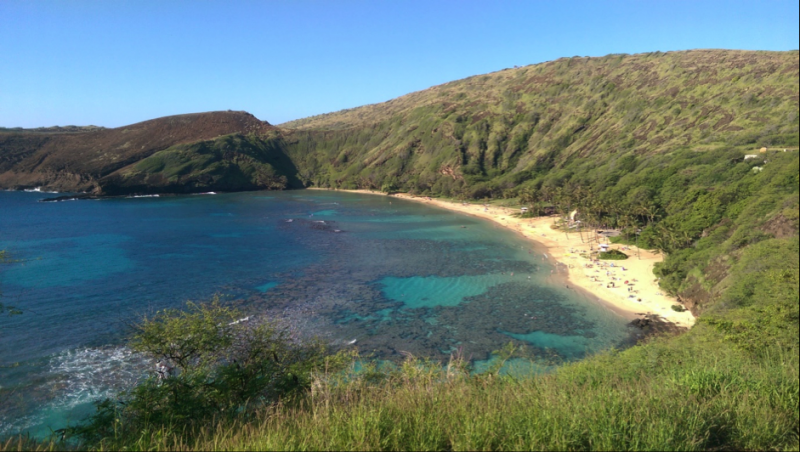ASLO Aquatic Sciences Meeting: Hawaii
Lucie Munns
National Oceanography Centre, Southampton

Photo caption: Beautiful Hanauma Bay was just a 30-minute drive from the conference centre in Honolulu, and made the perfect trip to wind down after the conference. The snorkelling was exquisite, and it was fun to fulfil the marine biologist stereotype, for once!
In March this year, Aquatic Sciences, (the biennial ASLO conference) was held in the fabulous location of Hawaii. The view from the plane coming in to Honolulu was a strange juxtaposition of idyllic turquoise waters and high-rise apartment blocks. I spotted the enormous Hawaii Convention Centre, and the scale of this conference began to dawn on me. It is one of the largest meetings of marine and freshwater scientists in the world, and a great opportunity for researchers of a wide variety of discipline to come together to share knowledge and ideas. I felt lucky to be taking part, and incredibly grateful to Challenger Society for the financial assistance.
Just hours after getting off the plane I was getting stuck in to a Science Communication workshop, led by actor Brian Palermo. We tackled how to approach communicating your science to general audiences in a completely different way, which was fantastic.
During the week-long conference there was at any given time up to 15 parallel sessions, along with hundreds of poster presentations, which gives an idea of the scale of the conference. It required some careful advance planning to make sure I did not miss any key talks. There were also lots of interesting lunchtime and evening sessions and events. For example, I attended an early-career researchers workshop in which we learnt about different career paths in science, and could put our question to a diverse panel of scientists.
A highlight of the week was of course having the chance to give an oral presentation on my PhD work in the session ‘New Directions in Plankton Ecology’. Presenting was a nerve-wracking experience, but it felt particularly rewarding to have other scientists approach me after my talk to discuss my research further. I also had an opportunity to meet and chat with some renowned research scientists in my field such as Zoe Finkel, who are experts in topics relevant to my work. I networked with researchers who are based at US and Canadian institutes, whom I would not have had the chance to meet with face to face had I not had the fantastic opportunity to attend Aquatic Sciences 2017 – Mahalo Challenger Society!
Profile: Lucie Munns, Third year PhD student at University of Southampton, National Oceanography Centre.
My research explores the diversity of photophysiology in Coccolithophores, an important group of phytoplankton, with a view to improving our understanding of the ecology and biogeography of these key algae.
Before starting my PhD studies, I completed a Bachelors’ degree in Natural Science at the University of Cambridge and worked in a medical pathology lab. I then returned to academia to study for an MSc in Oceanography at the University of Southampton, and have not looked back since!
Latest News
Royal Society Publishing Photography Competition 2025
Please see a message from the Royal Society below:
We are delighted to announce that the 2025 Competition is now open for entries until 15 August for a chance to win £1000! The competition celebrates the power of photography in conveying the wonder of science happening all around us and photographs can be submitted in the categories of: Astronomy, Behaviour, Earth Science and Climatology, Ecology and Environmental Science, and Microimaging.
The competition is free to enter and open to anyone studying or working in science at graduate level or above. Category winners will receive a one-year membership to the Royal Photographic Society and the overall winner will receive a grand prize of £1,000. Find out more: https://bit.ly/RSPphotocomp
October 2025 MEDIN Workshop: Marine Data Management, Governance and the MEDIN toolset
The Marine Environmental Data and Information Network (MEDIN) are pleased to announce that registration is now open for the next occurrence of our popular free online training workshop: ‘Marine Data Management, Governance and the MEDIN toolset’ on the 13th – 17th October 2025 on OceanTeacher Global Academy.
Marine Data Management, Governance and the MEDIN toolset
The Marine Environmental Data and Information Network (MEDIN) and OceanWise are delighted to invite you to attend our popular free online training workshop: ‘Marine Data Management, Governance and the MEDIN toolset’ on the 19th – 23rd of May 2025.
